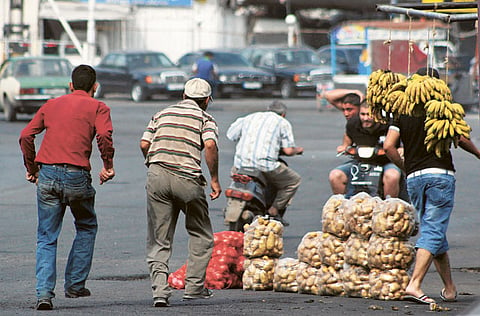Recent sectarian strife echoes Syria's conflict
‘We will not have peace until we get rid of Al assad regime'

Beirut: The year-long crisis in Syria has exacerbated sectarian tensions between two adjacent districts in Tripoli, Lebanon's second city, transforming them into a microcosm of the turmoil and bloodshed wracking Syria.
Although clashes are not uncommon here, the past week has witnessed some of the fiercest fighting between Sunnis and Alawites in Tripoli in years..
"We will not have peace here until we get rid of the Syrian regime. All our problems, all the violence, all the poverty we suffer here are because of the Syrian regime," says Shaikh Bilal Masri, a militant Sunni cleric, talking over the crackle of a walkie talkie on his coffee table.
The thin, wiry preacher, who follows the austere Salafi sect of Sunni Islam, says he has not slept for three days and suffers from a persistent cough which he blames on smoke inhalation from burning tires and explosive residue. He picks up an old rifle fitted with a telescopic sight and pats the wooden stock affectionately.
"I shot two of them with this," he says, handing over the French sniper rifle dating from the late 1940s.
Pot shots
A few hours earlier, he and other Sunni militants had been manning a frontline of bullet-holed, fire-scorched buildings and barricades of car tires while taking pot shots at his enemies hidden among the tower blocks in the adjacent hilltop district of Jebel Mohsen, home to Lebanon's small population of Alawites, an obscure splinter sect of Shiite Islam.
The Sunnis of Tripoli broadly support the mainly Sunni opposition in Syria. But the residents of Jabal Mohsen are members of the same minority Alawite sect which forms the backbone of the regime of Syrian President Bashar Al Assad.
On the main street in Bab Al Tebbaneh at the foot of Jebel Mohsen, Lebanese special-forces troops hunched over heavy machine guns mounted on armoured personnel carriers or humvees.
Other soldiers rebuilt fortifications for small outposts damaged in the fighting. A pipe severed by bullets sent a spray of water into the air. The street was filled with garbage, broken glass, and rubble from exploding rocket-propelled grenades.
One Sunni resident ruefully examined his black BMW, which was riddled with bullet holes, the windows shot out. Others cast cautious glances at the apartment blocks of Jebel Mohsen towering above, from where snipers still continued to send the occasional round cracking overhead.
The Alawites in Tripoli blame the resumption of violence on the Sunnis living in the neighbourhoods that surround their isolated hilltop stronghold.
— Christian Science Monitor
Sign up for the Daily Briefing
Get the latest news and updates straight to your inbox



